Joe Leinburd
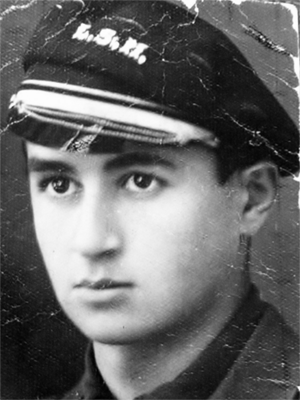
Born: Suceava, Romania, 1922
Wartime experience: Transnistria
Writing Partner: Michele Kesten
Joe (Joseph) Leinburd was born in Suceava, Romania, in 1922. In 1941, the Romanian government, in collaboration with Nazi Germany, deported the Jews of Northern Bukovina and Bessarabia to Transnistria, an area between the Dniester and the Southern Bug rivers.
Joe, his parents and his brother survived a death march from Moghilev (now Mohyliv-Podilskyi, Ukraine) to the town of Murafa, where they were forced to live in difficult conditions for two and a half years. They were liberated in 1944 and returned to Suceava. In 1946, Joe married Claretta (Lala) and they soon fled Communist Romania for Italy, where they spent two and a half years in a displaced persons (DP) camp. In 1949, they immigrated to Canada. Joe and Lala lived in Winnipeg and Calgary, where they raised a family and Joe started a successful company, Caravan Manufacturing, that made cowboy shirts. Joe and Lala eventually retired to Toronto to join family. Joe was active in Holocaust education for many years. Joe Leinburd passed away in 2024.
Suceava before the War
When I was a boy, the Jewish population of Suceava, Romania, made up about a fifth of the city. Suceava is in the Bukovina region, which was close to the Hungarian border and had earlier been part of Austria-Hungary. Suceava was a very cultured town with theatres and concert halls. It was a great city for art, music and theatre.
In my class at school there were eighteen students; eight of us were Jewish boys, all friends, all very enthusiastic about our studies. We learned French, Italian, English, German and science. It was an excellent education. I was nineteen years old when I finished, and my future looked good. I was very interested in becoming a doctor, and my father had arranged for me to study medicine at the Sorbonne in Paris the next year. He’d already paid in advance for my tuition and room and board for four years. Although the war ruined that plan, the intensity I brought to my school work spread to my other activities, and I believe the knowledge and talents I gained during those days helped me in my survival during the war and have enhanced my enjoyment of life to this day.
Life before the war was wonderful. My father’s store was one of the biggest in the city, and although I never worked there, I’d go in to see what was happening. I knew all the employees, and everybody in town knew me because I was Joe, the son of Nathan Leinburd.
For my own reasons, I was very active outside of my family. It was difficult communicating with my parents when they didn’t speak Romanian at home, mostly German and Yiddish, and this also deterred me from having people over, so I spent most of my time outside the home.
I played many sports — volleyball, basketball, tennis and soccer were favourites. I was the Ping-Pong champion of Suceava when I was sixteen and seventeen. Every morning and evening I had to practise, and that kept me energized because I could leave my house and go to the clubs to train. I kept myself very busy, also going to clubs to play chess and becoming good at that too. I had a passion for painting as well and was recognized in town for my talent, which also helped me later in life. On top of all this, I spent a lot of time on my stamp collection.
However, there were small hints that this ideal life might not last. One incident when I was young affected me and I remember the scene exactly. I was around twelve years old and was involved in preparing for the celebration of my bar mitzvah. I came home from school and couldn’t believe what was happening there. I saw my parents, my mother sitting on my father’s lap, and they were crying. My father’s mother had written from the Ukraine that their family was hungry, that they couldn’t get food. My parents were devastated that they didn’t know how to help my father’s starving family. This image stayed with me, and I started to learn from my father about what was happening in the Soviet Union. Because I was interested in speaking Yiddish and could learn languages easily, we were able to discuss events. My father told me about the Communist leaders and the torture and all the things that were happening where the Soviets were in control.
We also talked about what was happening elsewhere in Europe. My father was politically aware and through him, I became more and more interested in geography, the national condition and international politics. I had respect for my father’s understanding of our situation and his vision for the future. We read the paper every day. It told us not only about events in Bukovina and Romania but also about what was happening in Europe and the rest of the world. We discussed the information and knew something of the threat of Hitler’s rise to power in Germany.
At that young age, this knowledge made an impression on me and I started to prepare myself by reading. However, no one else seemed interested in what was happening in the Soviet Union or Europe, not my brother, my friends or even my uncle in Bucharest — only my father and me.
My father observed the rise of Hitler and his antisemitism, read articles in newspapers and discussed the situation with friends and family. But nobody expected the trouble would be upon us so fast. My uncle in Chicago, Harry Lane, had even obtained documents for us to immigrate to the United States, and had a job for me there. But my father had worked hard so we’d have everything we could want or need, and he was still able to make a good living. He was afraid to leave it all. None of us thought we needed to leave immediately.
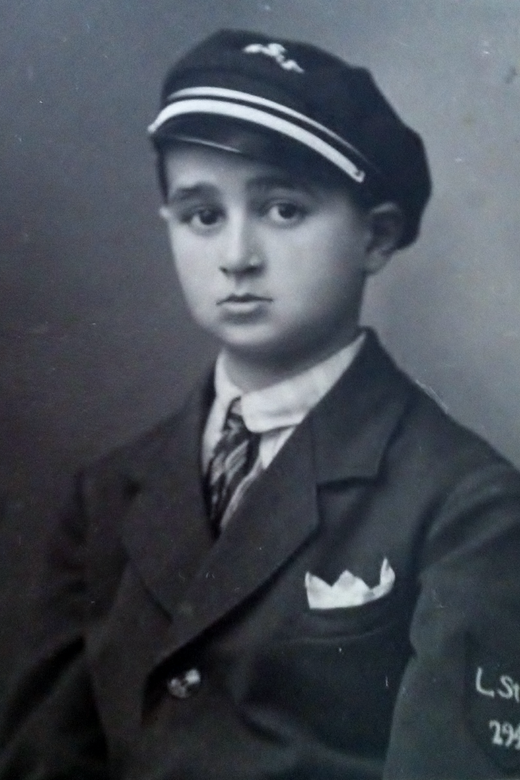
Joe wearing his school uniform. Suceava, Romania, circa 1936.
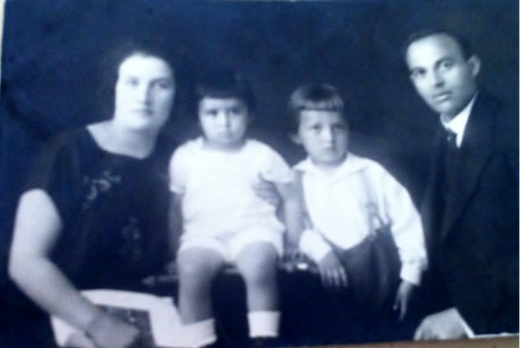
From left to right: Joe’s mother, Lea; Joe, his brother, Jacob; and Joe’s father, Nathan. Suceava, circa 1925.
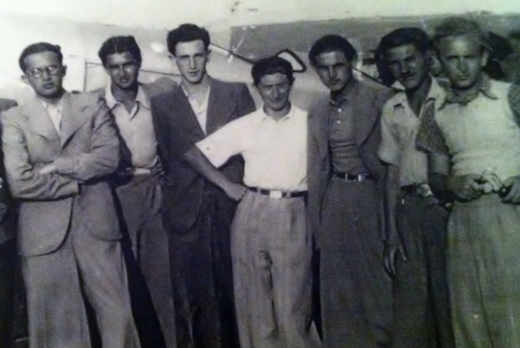
Joe (second from left) with friends. Suceava, 1940.
Even then, we never considered we’d be sent to a death camp or a work camp. We didn’t know about those things. We didn’t consider it because we couldn’t imagine it.
Marching through Terror
After invading Poland, Hitler made advances throughout Europe. Eastern Europe collapsed against the Nazis’ military might. The Romanian armies under Marshal Ion Antonescu promised full and total allegiance to Hitler, and Romania joined Germany and the Axis powers in invading the Soviet Union.
Many harsh antisemitic laws were passed in Romania during this time. Throughout the country, vicious crimes were committed against the Jewish people by the state, the army, police, civil authorities and collaborators at large. There was a period of pogroms, killing Jews, especially in small towns but also in large centres such as Bucharest, Iași and Dorohoi. The Holocaust began in Romania in 1940, and the world stood by — foreign embassies, consular offices, diplomatic corps and foreign news reporters witnessed the killings of Jews, but no counteraction from their respective governments took place. They were bystanders to the Nazi ideology in full control of Romania.
This was a bleak period for the Jews in Suceava. Although we were spared the huge pogroms and the killings that occurred in other parts of Romania, Jews lost their jobs, and professionals like doctors and lawyers were restricted in how they could work. Citizenship was taken away. We were constantly at the mercy of the government and their controlling new laws.
I felt constant fear. We had no choice but to go along with the government’s awful rules and try to avoid the leaders and other antisemites. I didn’t go out with my girlfriend very often because it meant I’d have to cross the street past the office of the Cuzas, an antisemitic group whose organizer had previously held a lot of power in Romania.
***
In the spring of 1941, we knew something very bad was going to happen when we were forbidden to have a radio in the house; by the fall, we were required to wear a yellow star on our clothes. We had lost our freedom. We were no longer able to make decisions about our own lives. We just waited to see what would happen, what the government would do next. At home, there was sadness. It was heartbreaking to see what was happening to us — to my neighbours and all the Jewish people I knew.
Even then, we never considered we’d be sent to a death camp or a work camp. We didn’t know about those things. We didn’t consider it because we couldn’t imagine it. But I knew that something was going to happen. I identified myself with all the Jewish people of the world, and I was worried.
***
Loudspeakers were blaring and drums were beating and the noise was constant. The signs on the road said that all Jews had to be at the train station by five o’clock, October 9 — that very day. I was more afraid than I’d ever been or have ever been since. And this from Romanians — I’d never have expected that. I could never have imagined that. This realization caused my greatest despair.
I remember being angry and hurt as we made our way to the train station. The people in town, people we’d served in our store and lived with as friends, turned their backs on us. That was a terrible experience. They didn’t want to see us to say goodbye. We’d built up a company that dressed their families, and other Jewish families had helped them — the doctors, the engineers — we were all being sent away. No one knew if we were coming back, yet they didn’t even want to look at us. Maybe they were afraid or maybe they were ashamed. I don’t know, but it hurts, even today.
***
In the morning, Romanian soldiers told us we’d be crossing the Dniester River into Transnistria, in the Ukraine. We crossed the river in open barges, like rafts, in groups of twenty people. It was cold. We’d lost all sense of time, but it must have been around the middle to end of October, and in the Ukraine it was winter.
The worst part of the trip of about two hours was looking down and seeing bodies in the water. Some were suicides and some had been killed, not killed in the sense that they were shot, but people killed by hunger and disease. Maybe some were shot, I’m not sure.
We arrived in Moghilev, a large town that was the assembly point for all the people coming from Romania. When we got off the barge, soldiers took us to a field where we stayed overnight with hundreds of other people.
We were pessimistic, afraid, anxious about what was going to happen to us. Nobody from our family back home knew where we were. We didn’t know how, or if, we were going to live, but we didn’t really believe we’d be killed. We were concerned about how we were going to survive here, what we were going to do. Where were we going to sleep? We had little with us to help us survive. There were hundreds of things to consider, but we just hoped that we’d arrive at a place where we could rest. But really, we didn’t know anything. To add to our fears, the town was being bombed every night and there was no place to hide. There are no words to describe the circumstances, the feelings of fear, of desolation, of the unknown tomorrow.
***
Our group was sent to Murafa. My family — my parents, my brother, my uncle and me — went together with about two hundred and fifty people from various towns. We were all Jewish. We didn’t know how far we were going, but we marched steadily for at least three days, stopping only to sleep in fields.
It was a very difficult march. There was snow and mud on the ground, and during the journey it rained and snowed some more. We had orders not to get out of the line, not to stop, not even to pause, or we’d be shot. We had to stay in the same line, three or four people in a row. We weren’t given anything to eat or drink. We had only the possessions we’d brought with us and had to carry them all the time. We threw away a lot of belongings because they became too much.
The cold was severe but it wasn’t as bad as the mud, which made it difficult to walk. People’s shoes were sucked into the mud, and they couldn’t even stop to retrieve them because the order was to continue walking or be shot. Many ended up walking barefoot. And we were not allowed to help each other. We were not allowed to carry anyone or assist anyone in any way. We kept soldiers away from young children, so they wouldn’t hurt them. That was the job of parents, to watch the children, to keep them going, to make them listen to and obey what they were told.
Everybody in our family managed to keep in line and walk steadily. We’d brought some food from home, some bread and some potatoes. My dad exchanged something with a soldier for some bread, and I saw a lot of people out in the fields searching for anything left over from fall, some vegetables to eat, even if they were rotten. The situation was becoming very bad. If people got sick and couldn’t march, they died. But we survived and, incredibly, many of the people we were with also survived.
We just walked and walked and walked, braving hunger, thirst, fatigue and the fear of what was next, always threatened by the Romanian soldiers to keep moving in line. Many of the elderly, sick or very young fell behind and had to be abandoned, left alone in the freezing temperatures. Nobody dared to assist them.
I was nineteen years old and I still relive this time constantly today. I can see us, but it’s impossible to describe my feelings about this event that occurred over seventy years ago. To convey a sense of the reality today is difficult. Nevertheless, it is my story and there’s no way of getting away from it.
The most difficult memory for me was watching my adored violin teacher being sucked into the mud, holding his violin case over his head, protecting his violin. He was an elderly man and he had sunk into the mud and couldn’t get out. His wife and children were further down the line and they were warned they’d be shot if they went to him. I wished that they would have but understand why they didn’t. We just left him. I don’t think he was shot but he was probably abandoned, left to die in the cold or to be killed by animals. I felt totally helpless.
***
The last year, the end of 1943 through the spring of 1944, the atmosphere in Murafa improved. German pressure on us was weakening. Although we still didn’t have newspapers, radios or telephones, we got information from some Soviets that the Germans were retreating and the Allies were bombing Germany. Also, we received more food and better living conditions with the help of the Jewish community of Bucharest along with Dr. Filderman, a leader in that community who had been in Transnistria and advocated for us all. Our circumstances improved. As spring arrived, we enjoyed being outside in the warmth and light of the sun. We became healthier, and, for the first time in Transnistria, we felt hopeful that everything might work out.
At the end of March 1944, we ran to the hill when we heard that the advancing Soviet army was arriving. I saw the troops coming. They looked very small to me, like children; they were students, eighteen, nineteen, twenty years of age. They could hardly carry their guns. They were dragging them, but they were running. They knew they had something important to do. Soviet intelligence had told them they had to come to Murafa that day.
When they reached us, my dad walked out to them and thanked them for coming. When he told the captain what we had gone through and who we were, I saw the captain crying. He was stunned. When my brother and I came out, he started crying again, sobbing. He must have looked bad to his soldiers, crying and crying, but then he gave an order that they should give the Jews everything they had — food, clothes, anything to help. I was very moved when he went into the town to see what was happening. I knew then we were saved, that we were going to be safe. The memory of that March day is a strong and joyous one.
That captain saved my brother and me. He suggested that my dad let us march to Romania with them because once they left Murafa, the Soviet authorities were coming to take all the younger people to work in mines and do other labour.
We marched with the soldiers for about a month, to recapture Bukovina. We didn’t wear uniforms, but we helped them by translating for them. The soldiers had a good time with us, and although we walked for a long way, we didn’t mind because we were safe. The Germans were shooting and bombing along our route, but we knew in advance and watched out for them. And we had as much food as we wanted.
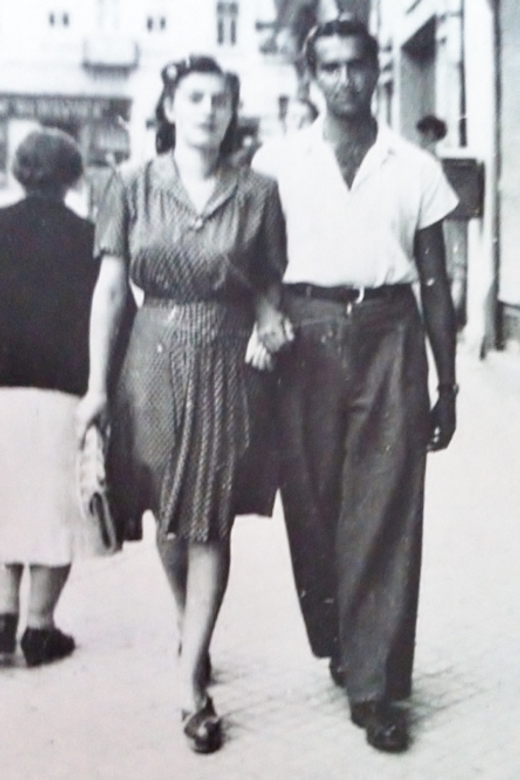
Joe and Lala on a date in Suceava, 1944.
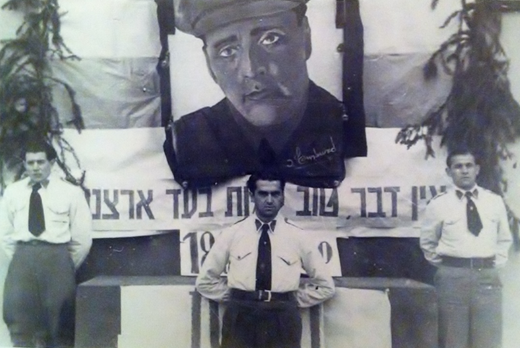
Joe (centre) in his Betar uniform in front of a portrait he painted of the Zionist hero Joseph Trumpeldor. Rivoli DP camp, Italy, circa 1947.
Joe with his Sustaining Memories writing partner, Michele Kesten. Toronto, 2014.
Keeping Memories Alive
In the meantime, I started to get our home ready. I found out who’d lived in our apartment while we were away but got back only two chairs and a little table from them. I arranged for people to come in to clean and make repairs and I used some money from jewellery I still had to buy some new furniture. My dad had told me about his hiding place in the ground under the staircase, and I found a gold piece buried there that was worth a lot.
People from my orchestra began to gather, and we few started playing together again. But that period of time, from the moment I walked into our house until I got to play music again, seemed long. My parents didn’t arrive home until three months after my brother and me.
I felt comfortable in town again. The people in Suceava fought their unease by helping me and by asking me a lot of questions. So they were fine. The antisemitic leaders were not in the city anymore. They’d moved, I assume to different towns, so as not to be recognized. It wasn’t my job to search for them.
My parents returned and I was happy. I found some work painting posters. I was playing my violin again. I was back with friends and soon met my future wife, Lala. I felt comfortable with my Romanian neighbours in town.
One day I was asked to work downtown to paint Communist slogans on posters and put them on the outside walls of City Hall, the main building in town. While I was on the ladder, putting up the posters, I heard people walking by on the street. One of them said, “That young Leinburd is now working for the Communist Party!” When I heard that, I made up my mind I was not going to stay in Suceava, or in Romania. I didn’t like Communists and was afraid my parents would suffer. My father was a fine businessman, but the Communists wouldn’t let him continue to do business as before. I again wished my father had left in 1938 when he’d had the chance, and I decided that I was going to grab the first chance I got to live in North America.
My uncle in Chicago sent me documents offering me a job and agreeing to sponsor me. The closest American consulate was in Italy, so I decided Lala and I would leave Romania and go through Austria into Italy. I could not leave legally but I left anyway. I’d left Romania for Transnistria when I was nineteen years old. When I left Romania for Italy, it was 1946 and I was twenty-four.
The first thing Lala and I did was go to Genoa, to the American consulate, with the documents my uncle had sent. The Americans would not accept me. However, I read in an Italian newspaper that Canada was accepting immigrants, but only if they were tailors. So I took a course to qualify as a tailor and had my diploma in eight months. Unfortunately, by then Canada was no longer in need of more tailors, but they did need tractor mechanics. So I took a course in tractor mechanics. I was accepted into Canada as a tractor mechanic, and my wife as a domestic worker.
We lived in the Rivoli displaced persons camp for two and a half years. I loved Italy. We were free. We were alive. And Italy was a beautiful country. The Italian government and people were very friendly to newcomers, to war refugees. Even though we had no money, we were able to travel all over — all we had to do was show a page from a siddur, to prove we were Jewish, and we could go anywhere for free.
***
It’s not easy thinking about my experiences during the Holocaust. When I work on this memoir in the mornings, I feel emotional and can’t concentrate on anything in the afternoon. The sad memories stay in me and not a day goes by when I don’t have some thought of suffering during the deportation.
I was happy in my youth and couldn’t have imagined anything but the privileged life I had until my dreams of becoming a doctor were shattered, and instead of studying in Paris I lived a nightmare when the Jews of Bukovina were suddenly deported to that primitive area in Transnistria.
I can’t forget the journey to Transnistria, can’t forget not knowing where we were going or watching my relative’s suicide or my violin teacher being left to die in the mud. I can’t forget the many deaths in Murafa, from typhus, starvation, freezing temperatures and inadequate shelter, and then being forced to throw the bodies in a pile in an open field. I will never forget not knowing what was happening, having no communication with the rest of the world, and not being able to think about a future. I will never forget hiding repeatedly from German soldiers in a hole in the ground for a full day, or the fear of being caught. I will never forget the darkness, no light to read by; no enjoyment of sports, friendship, music; no toilet facilities, not even outhouses. I will never forget meals of potatoes three times a day, and people eating grass.
But when I realize where I am today and that I survived, I’m thankful. My family and I were lucky to leave Murafa alive, but life there actually isn’t important. What is important is that we weren’t killed. We survived and lived to have a good future.
I accomplished a lot in Canada. In my work, I was a good employee who tried hard to bring success to the companies I worked for. I built a flourishing business and was a good employer who treated staff well. My company was recognized in Calgary, in Canada and around the world. I have a good reputation from my business and community activities. I’ve had good friends. This all keeps me very alive and satisfied. I’m very happy when I go over my collection of documents, and I’m proud of the honours I’ve received. I have family and friends around the world and keep in touch with them, mostly by email. I continue to enjoy many pleasures of my youth. And most important, I have my children and grandchildren. This makes me all think much more about the present than about what happened in the past.
But I have an obligation to keep the memory of my experience alive. Future generations should know what happened to the Jewish people during the Holocaust. I feel if we survivors don’t tell them, it would be kind of a curse upon us. We need to put our experiences on paper and voice our concerns and opinions. People need to hear about my suffering, to hear a real story and realize my story could be their story. I want Jews and non-Jews to prevent antisemitism from rising again and to support Israel as a safe place for all Jewish people.

